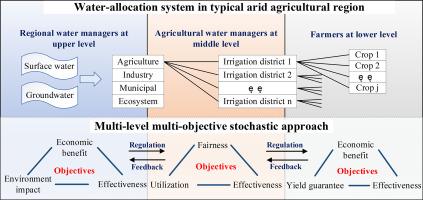当前位置:
X-MOL 学术
›
Agric. Syst.
›
论文详情
Our official English website, www.x-mol.net, welcomes your feedback! (Note: you will need to create a separate account there.)
Towards sustainable water management in an arid agricultural region: A multi-level multi-objective stochastic approach
Agricultural Systems ( IF 6.6 ) Pub Date : 2020-06-01 , DOI: 10.1016/j.agsy.2020.102848 Fan Zhang , Shanshan Guo , Xiao Liu , Youzhi Wang , Bernard A. Engel , Ping Guo
Agricultural Systems ( IF 6.6 ) Pub Date : 2020-06-01 , DOI: 10.1016/j.agsy.2020.102848 Fan Zhang , Shanshan Guo , Xiao Liu , Youzhi Wang , Bernard A. Engel , Ping Guo

|
Water-shortage crisis is threatening the food production and sustainable development around the world. Especially for arid agricultural regions, it is necessary to plan sustainable agricultural water management strategies for improving water use efficiency. But there are many complexities in it, such as multiple decision-making levels, objectives, water users and uncertainties. To effectively tackle these complexities, this study presents a novel optimization-modeling approach consisting of a multi-level multi-objective stochastic programming (MLMOSP) model and weighting quantification method for formulating sustainable water-allocation schemes in arid agricultural regions. The MLMOSP model incorporates multi-level programming, multi-objective programming, and stochastic expectation programming into a general framework. The proposed approach is capable of: 1) quantifying key factors affecting water-allocation systems through weighting quantification methods; 2) describing the main conflicting objectives of each decision-making level, including economic benefits, environment impacts, fairness, effectiveness, and crop yield; 3) considering tradeoffs among conflicting objectives, and 4) reflecting the leader-follower relationship under different scenarios of surface water availability at a regional scale and a monthly temporal resolution. The proposed approach is applied to a real-world case in a typical arid agricultural region of northwest China for verifying its validity. From this real-world case, it is found that: 1) optimization results corresponding to different flow-level scenarios of surface runoff can provide upper-, middle-, and lower-level decision makers with a set of decision alternatives to help identify the most appropriate management strategy; and 2) multiple model comparisons show that the MLMOSP approach can not only give more practical results guaranteeing the achievement of decision-making goals at different decision-making levels, but also help reduce groundwater extraction under different flow level scenarios of surface runoff.
更新日期:2020-06-01



























 京公网安备 11010802027423号
京公网安备 11010802027423号